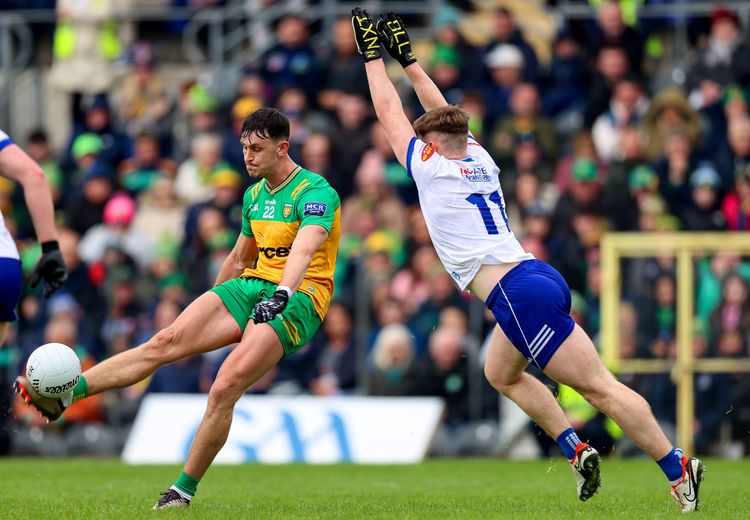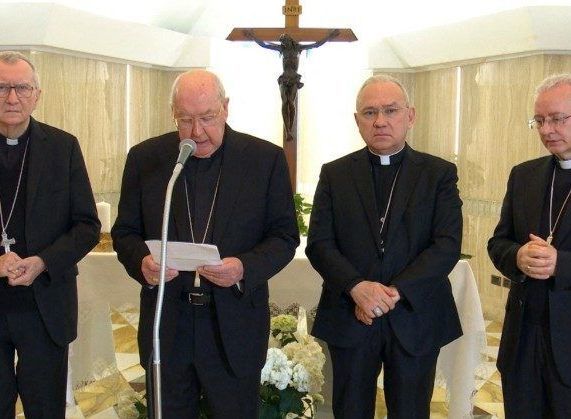Tom Phelan on a recent visit to his hometown of Mountmellick, Co. Laois.
PHOTO: PATRICIA PHELAN
A Father's Day remembrance by Tom Phelan
On a summer's evening, the farmyard was dry and musty and soaked in the memories of childhood. On the barn wall still hung the two slatted sideboards of a horse's cart, blue like a blackbird's eggs. The half-doors of the Heifer House were still hanging crooked; the same chain hung there with the big link at the end to hook onto the same piece of bent iron set into the wall. I touched the smooth big link, held it between my fingers, and saw my father and myself pulling on a rope that was tied to the protruding yellow ankles of a calf still inside its mother. I heard the cow moaning and my father saying "Now!" and I felt the calf slipping and saw the cow's end stretching into a large O. I heard my brother Liam behind me saying, "I'm ready to go, Tom.”
My father was dying. In a midnight phone call to New York, Liam had called me home to Ireland. Now we were going to The Home where my father was living his last days.
It was as if my father had been waiting for me, as if he knew that I had been standing outside the door. His two arms were held feebly in the air, as if reaching out to take a baby.
"Tom!" he cried.
"Dad" I sobbed, as we awkwardly clutched each other, my wet bearded face next to his trembling toothless mouth, the son bending down, the father reaching up, each clutching at something that had slipped out from between them and grasping it for a fleeting moment.
I got down on my knees beside the bed and held the backs of my father's fingers against my forehead, and my sobbing body made noises in the springs of the bed. I felt my father's free hand in my hair, touching, resting. I heard his cries, like the creaking of an old barn in the wind.
"Tom," he said eventually. "I was hoping you'd come home to rake the stubbles. You'd better use the White-Faced Mare, even though she'll drive you mad with that tail of hers, swiping at flies even in when there's none to swipe. The wheelrake is over the Sandpit Field near the gate. And be careful coming through the Hill Field gate! It's barely wide enough--and don't forget to put the grease on the axle."
Watching my father's face, I saw the old eyes looking at the past, watched them wander all over the farm, unable to unscramble the layers of time, seeing people and horses in the wrong years and seasons. The words flowed out of knots of time trapped in his memory, rising to the surface like random bubbles floating up from the deep bottom of a dark boghole. He spoke again.
"How much time did they give you?"
"Two weeks."
I got up and pulled the straightbacked chair to the bedside.
"Two weeks! ... I told Liam two weeks ago to move the cattle out of The Rushes into Nan Flanagan's. But he wouldn't listen. They'll skin The Rushes, and there won't be a bit of grass in the Spring."
The lostness of my father's mind added to my sadness, and I bent my head to my chest. I cried as foals were born and horses died, as the rain ruined harvests and cattle broke down fences, as hay was saved and bits of football matches were replayed, as fields were plowed and neighbours emigrated.
I left the room, and in a dark corner in the corridor I cried in silence. I did that every day for two weeks.
On my last day home, I was sitting in the wide hedge that straddled the spine of the Sandpit field. In the slanting sun, rabbits nibbled their way from the safety of their burrows, their noses and eyes twitching. I was staring into the hollow below when I became aware of someone approaching. The rabbits hopped, then vanished.
It was Liam swishing his way through the tall sour grass that grew in the shadow of the hedge. I moved my hand in greeting, and Liam checked a sitting place with the edge of his boot.
I spoke first. "The last time I was home, I sat here with Daddy. He fired shots at a rabbit three times--and missed. I don't think he really wanted to hit it.”
We gazed down into the hollow, across the sheets of golden buttercups and over the hedge that separated The Sandpit Field from The Rushes.
Liam said, "It was hard for everybody when Daddy slowed down. He'd get terribly cross at himself. He wanted to go to The Home, but Mammy couldn't bear the shame of it. Then you wrote and told her to let him go. That was the best letter you ever wrote. We brought him up on a Thursday evening.”
A spear of breeze startled a group of buttercups.
"The next morning I went to see him, and when I was coming home I stopped in at Paddy Curry's. Paddy asked. "Where are you going all dressed up?” and I said I'd been up to The Home to visit Daddy, and then I burst out crying. I felt like a real one in front of Paddy." Liam sniffed loudly and wiped the back of his hand across his nose. A half-strangled sob escaped into the thick grass.
He spoke again. "That was Daddy's favourite place over there at the beech trees. It's mine too. It's the nicest place on the farm. The Sunday before we brought him to The Home, Mammy came out to me in the Barn and said she couldn't find him. We looked in all the houses, and then we went across the fields. When we got to the gate, we could see him sitting on the high roots of one of the trees. The cattle were all around him, sniffing. It was like he had come over to say goodbye to them. To say goodbye to the whole thing.
"I let Mammy go ahead. I stayed at the gate. Mammy got him, and I waited there at the gate for them. And then I walked home behind them. It was terribly sad.”
I started to cry.
Then with great sorrow, Liam began to sob. Together in the hedge, we wept, letting the sadness come out loudly and unashamed. Side by side in the bushes, Liam with his head on his arms across his up-pulled knees, me looking blindly at the beech trees, the tears flowing itchingly into my beard.
We sat there for a long time. The rabbits had reappeared.
© 2017 Glanvil Enterprises, Ltd. An earlier version appeared in “Here’s Me Bus” (Summer 1995). For more about Tom Phelan and his work go to: www.tomphelan.net.









